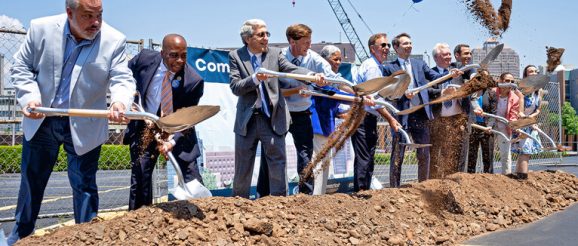Breaking ground on a ‘shared vision’ of innovation and success

Standing under a hot sun with a stainless-steel shovel in hand, Yale President Peter Salovey joined state and local leaders on June 7 to break ground on 101 College Street, an ambitious development project that will bolster New Haven’s rising status as an international center for entrepreneurship and innovation in the life sciences sector.
Yale will serve as an anchor tenant in the building, a key component of the city’s Downtown Crossing economic development plan for transforming the Route 34 corridor from an expressway into a series of walkable boulevards. The university also is supporting a biotech incubator at the site that will provide facilities for and nourish New Haven-based startup companies.
Speaking at a podium with a banner reading “Community in Progress” behind him, New Haven Mayor Justin Elicker ’10 M.E.M./M.B.A. said the 101 College Street project represents an important step forward for the city as it emerges from the COVID-19 crisis and continues to confront issues of racial injustice and inequality.
“Today is a reminder of the fact that our city is in a position of strength; the fact that so many people are investing in our city and that we are prioritizing inclusive growth — that as we grow, we must all grow together,” Elicker said.
Also speaking at the groundbreaking event were Connecticut Gov. Ned Lamont ’80 M.B.A., U.S. Sen. Richard Blumenthal ’73 LAW, and, via recorded message, U.S. Rep. Rosa DeLauro.
The university has signed a lease to occupy about 125,000 square-feet of taxable space on three of the building’s 10 floors of office and biomedical lab space. It will also provide financial backing and additional support for the 48,000-square-foot incubator space. Elicker thanked Salovey for these early initial commitments, which enabled the project to move forward.
“We’re grateful for your partnership with this project,” Elicker said, addressing Salovey. “This project would not have happened without Yale University.”
In his remarks, Salovey acknowledged both his professional connection to New Haven as Yale’s president and his personal connection as a 40-year resident who considers the city home.
“We are thrilled to be a part of the economic development that this project represents and the broader economic development that we are seeing in our city,” he said. “In 40 years, I never imagined I’d see so much being built: residential, commercial, research space. It’s amazing.”
The project is located directly across the street from 100 College Street, the current home of Yale spin-off Alexion Pharmaceuticals and, by fall 2022, the home of Yale’s new Wu Tsai Institute, an ambitious research enterprise that will combine the psychological, biological, and computational sciences. The projects, combined with rest of the Downtown Crossing plan, will connect the city’s downtown with adjacent neighborhoods and bridge Yale’s medical and central campuses.
“We are grateful for that bridge,” Salovey said. “That bridge will foster entrepreneurship and will bring jobs to New Haven. It will create enthusiasm and interest around innovation, which we have already seen growing exponentially in recent years.”
Since 2000, more than 75 startups born of Yale research have taken root in New Haven, Salovey said. Those companies employ hundreds of people and are developing cancer therapies, antibiotics, quantum computing and green technologies, and other products that serve society.
“These are businesses and startups that are improving lives,” he said. “These are businesses and startups that are strengthening New Haven and Connecticut’s economy.”
Salovey praised state and local officials, business leaders, and community members for creating an environment that will attract and support innovative ventures. The 101 College Street project represents “a shared vision for our home city” as an engine of entrepreneurship, innovation, and economic growth, he said.
“Together, we can make New Haven an international hub for bioscience [and] for pharmaceutical and health technology companies,” he said. “We are already seeing it happen. I can’t wait to see what unfolds over the next few years.”
Winstanley Enterprises, LLC, is the privately financed developer of the 525,000-square-foot, multi-tenant 101 College Street building. Construction is expected to begin in June.
The building’s ground floor will be an active civic space that opens onto an exterior public plaza. Arvinas, Inc., a clinical-stage biotechnology company with roots at the university, also agreed to lease three floors. BioLabs, a Cambridge-based company that specializes in managing co-working space for life-science startups, will operate the incubator.
Southern Connecticut State University’s BioPath program, a partnership with the City of New Haven, aims to generate a local pipeline of highly skilled, well-educated workers to staff the types of bioscience startups that the incubator will aim to support. Similarly, Yale’s Pathway to Science program provides the city’s middle and high school students opportunities to explore STEM fields through laboratory visits, classes, and more.
Lamont called the project a “case study of smart development.”
“This is an example of people working together,” he said. “This is an example of the community, the developers, the scientists, and the educators working together… . This is great day for New Haven. It’s a great day for Connecticut.”
